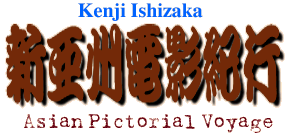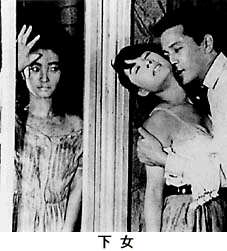
 There are many film festivals throughout the world, but the 3 major film festivals that head the list are called the Venice, Cannes and the Berlin Film
Festivals. Apart from unfolding various big and small events and bringing them to life, there are cases of driving into elimination with various circums
tances. Emelda Marcos loved movies and it was her that started International
film festivalsin Manilla, but after 2 times they went bankrupt. Under instructions from Emelda who put lots of drive into becoming shoulder to shoulder
with Europe, the heir ban was taken off Phillipine movies for these 2 years
only, but before riding this road the queen had been depurged.
In the second half of the 80's in Japan during the bubble economy, many film
s were produced. Together with the things that followed the Tokyo International Film Festival which started in 1985, the bubble bursting and the lack of
sponsers, the film festivals became phantoms and became fewer. Part of the famous Cannes festival screenings were 'selling' and do you remember it being
called 'Cannes beach film festival'? But just like a symbol of the bubble, hopelessly after 3 times they disappeared into oblivion.
There are many film festivals throughout the world, but the 3 major film festivals that head the list are called the Venice, Cannes and the Berlin Film
Festivals. Apart from unfolding various big and small events and bringing them to life, there are cases of driving into elimination with various circums
tances. Emelda Marcos loved movies and it was her that started International
film festivalsin Manilla, but after 2 times they went bankrupt. Under instructions from Emelda who put lots of drive into becoming shoulder to shoulder
with Europe, the heir ban was taken off Phillipine movies for these 2 years
only, but before riding this road the queen had been depurged.
In the second half of the 80's in Japan during the bubble economy, many film
s were produced. Together with the things that followed the Tokyo International Film Festival which started in 1985, the bubble bursting and the lack of
sponsers, the film festivals became phantoms and became fewer. Part of the famous Cannes festival screenings were 'selling' and do you remember it being
called 'Cannes beach film festival'? But just like a symbol of the bubble, hopelessly after 3 times they disappeared into oblivion.When focussing on Asian Film Festivals in Asia, we have romantic Hawaii, the southeast, Hong Kong, India, Singapore with its promoting power, Fukuoka (Asian Film Festival) and (Asian Focus Film Festival), Yamagata, Shanghai and Pusan have all been revealed. However, some ten years ago when film festivals started in 1954, they were not known about at all. These were the Asia Pacific Film Festivals (until 1983 called the 'Asian Film Festival'. The leader of the Japan Film Festival scene which reached it's golden age is Mr Masakazu Nagata who is a big time producer in Hong Kong, and with his product that he started constructing with Show brothers, after reaching no.1 in Tokyo heis continuing to go around affiliated towns. Japan is the country with the most festivals having eight (Tokyo 6, Kyoto and Fukuoka both having 1), however the number of well-known ones are pitifully low. The writer being born in 1960, I don't know about much of this time, but it seems that because the standard of movies in each Asian country was pulled up, Japan took leadership and started to manage things. For example, the Grand Prix in Manilla 1961 is Yasujiro Ozu's 'fine Autumn day' but, it wasn't described as the 'Asian Film Festival Grand Prix'. In 1985 the Tokyo Competition was held at the same time as the 1st Tokyo International Film Festival, and Pei Changho who took the Grand Prix prize (Deep Blue Night) (Korean) headed the list along with Hou Shaoshen (Winter holidays) (Taiwan), Edward Yen (Beijing), Leon Pooch (Hong Kong) etc. After this, in spite of the Asian film festival boom being centered around these works, at that time they really weren't a major issue of conversation. So when you think about it, the films at this time weren't really taken seriously by the Japanese film world or the mass media.
Actually there were many problems with the film festivals. Giving out lots of awards, strengthening the atmosphere of the producer friendship, it was the situation where it was a closed door film festival of the people in the core that were involved. Every year prize list data was dispersed by offices of developed countries (Japan's is Incorporated Association Japan Film Producers Federation). But it is difficult to take in the whole picture. Presently Asian films are constantly achieving the prizes of the world's major film festivals, and you wonder why this film festival is continuing. In ernest, for each country it is a great honour to win the Asian Pacific Film Festival Award, because it gives it a 'brand'. When you go to Malaysia's Film Museum of Film Companys, the tropheys are displayed in all their shimmering brilliance so everyone can see. In the respect of the Asia Pacific Film Festival, the gap between Japan and the rest of Asia is surprisingly big.
In the period when the film festivals were established around the 1950's, I'll mention that it was recognised that 'Japan's films were progressing and Asia's backwards'. Masters who played an important role in the golden age of Japan's films were Mizoguchi, Ozu, Kurosawa, Kinoshita, Gosho, Toyota. Imai....etc and for the people involved in movies it's not hard to imagine them thinking this. But, in 1961 the Asian Film Festival (Manila) the psycho thriller work of Kim Gyon (Korea),the 1961 produced Phillipine master Herald the Leon's work and also Mare's national star - P Rumley's comedy 'Ali Baba' etc, all got them reputations and labelled them as great men of classic asian movies. I feel that the long continuing certification of 'Japan's advancing movies, Asia's backward movies' was just a self satisfaction that was made up within Japan. Because the gaps in the unknown Asian film festival history have been become clear to us, I think it's pretty necessary to refresh our understanding. This is a case of pro asian artists and supporting the asian films and not an attitude of copyrighting.